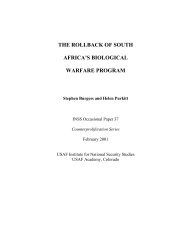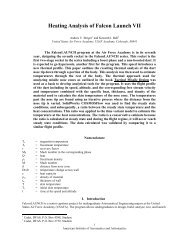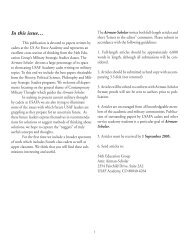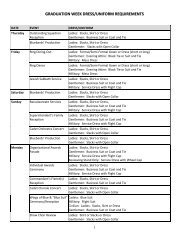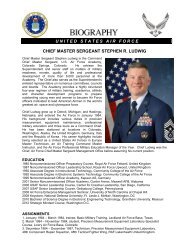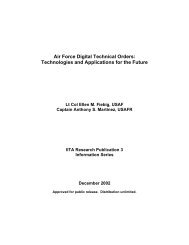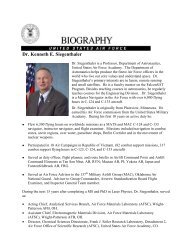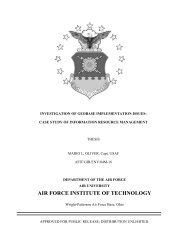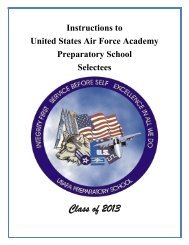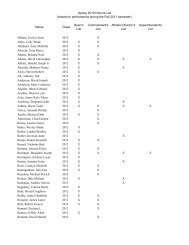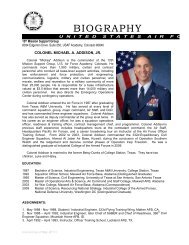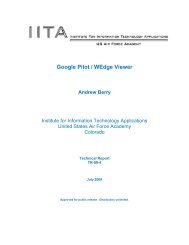Military Professionalism - United States Air Force Academy
Military Professionalism - United States Air Force Academy
Military Professionalism - United States Air Force Academy
You also want an ePaper? Increase the reach of your titles
YUMPU automatically turns print PDFs into web optimized ePapers that Google loves.
Halloran, Richard. “U.S. <strong>Military</strong> Chief is Replaced in the Central American<br />
Region.” The New York Times (July 21, 1989): A5.<br />
http://query.nytimes.com/gst/fullpage.html?res=950DE2DD153AF932A15754C0A96F9<br />
48260<br />
Following a public statement criticizing Bush’s Panama strategy, Gen. Frederick F.<br />
Woerner was pressured to retire and was replaced by Gen. Maxwell R. Thurman as the<br />
commander of American <strong>Force</strong>s in Central America. Pentagon officials said Gen.<br />
Woerner had displeased Sec. Cheney and the National Security Council by criticizing the<br />
Administration's Panama policy in public. In a speech, Gen. Woerner publicly charged<br />
that the Bush Administration was not prepared to deal with Panama's political crisis<br />
because of a ''policy vacuum'' caused by the change of administrations.<br />
Inskeep, Steve. “Army Walks Tightrope on Ties with Political Bosses.” Morning<br />
Edition NPR (Oct. 21, 2010).<br />
http://www.npr.org/templates/story/story.php?storyId=130656611<br />
President Obama stated that Gen. McChrystal’s negative comments about superiors,<br />
including the president, did not meet the standard that should be set by a commanding<br />
general and undermined civilian control of the military. Col. Moten said that the military<br />
should be an apolitical instrument of the state. At Fort Leavenworth, Army instructors are<br />
re-writing training manuals, everything from ethics to how a senior officer can offer<br />
policy advice without being seen as disloyal. The military plays a major role in the<br />
political process. Adm. Mullen encouraged officers to give their advice to policymakers<br />
privately, which might not always be possible, given that Congress can call service<br />
member to testify in open hearings.<br />
Kiel Jr., John Loran. “When Soldiers Speak Out: A Survey of Provisions Limiting<br />
Freedom of Speech in the <strong>Military</strong>.” Parameters 37.3 (Autumn 2007): 69-83.<br />
http://www.carlisle.army.mil/usawc/parameters/Articles/07autumn/kiel.pdf<br />
Public remarks by active duty officers against the President have become more prevalent,<br />
often using the Internet as the medium of communication. The Uniformed Code of<br />
<strong>Military</strong> Justice allows senior level officers to go as far as court-marshalling servicemen<br />
for publicly criticizing the administration. When a commander does determine that<br />
certain speech or behavior is having a detrimental impact on unit discipline, readiness,<br />
and morale, the UCMJ provides plenty of tools to ensure that timely, fair, and appropriate<br />
discipline is administered in the best interests of justice. Discipline should be<br />
implemented more readily to counteract the rising public criticism of the president by<br />
active duty servicemen.<br />
36




